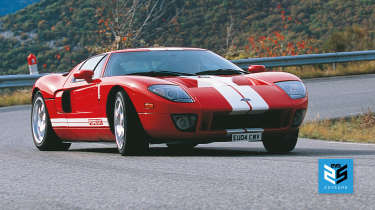Ford GT (2004 - 2006) review: Ford's supercar Ferrari beater
The Blue Oval’s second supercar was nothing short of remarkable, with few supercars allowing such easy access to their performance as the original Ford GT
Crowned evo Car of the Year in 2005 and more recently selected by us as one of the most significant driver’s cars of the last 25 years, the first Ford GT is one of the greatest analogue supercars of its time – and of all time, in fact.
Everything from its chassis and steering to its snickety Ricardo six-speed manual and supercharged 5.4-litre V8 immediately placed it among the top players in the supercar game. The combination of a mid-mounted V8, 550bhp driving the rear axle and no driver assistance might sound like a recipe for a handful, but the Ford GT proved to be one of the most approachable cars of its kind. Its high levels of performance are truly accessible thanks to precise controls, an expertly honed chassis and smooth power delivery. With tactile steering and excellent ride quality too, we even described it as a 550bhp Elise.
> MST Mk1 review – £174,000 Ford Escort recreation driven
Designed by Camilo Pardo under J Mays as both a modern interpretation of the iconic GT40 and a celebration of 100 years of Ford, the GT’s classical looks have stood the test of time well. Like the original, the doors incorporate sections of the roof in an attempt to ease ingress and egress, and while they do precisely the opposite in situations where you can’t swing the door fully open, they certainly add to the sense of occasion.
More reviews
The retro theme continues inside, with faux eyelets on the seat faces and analogue dials that make a refreshing departure from today’s screen-centric layouts. Some of the materials may fall short of expectations – there’s a lot of plastic to be found in there – but the driving experience more than compensates for any of its shortcomings. A more likely snagging point is that the GT was only made in left-hand drive, although a few examples have been converted to right-hand drive, typically for the Australian market where RHD is a legal requirement in certain states.
What we thought
'Perhaps it’s the old-school looks and historical baggage, but it’s hard not to feel daunted at the prospect of extending the GT – a car that feels as quick as anything I’ve ever driven, short of a Zonda F – on a road like this. But, unlikely as it sounds, once a few sinuous miles have rolled beneath its wheels, you know that the trickiest and most intimidating aspect of the Ford GT is climbing in and closing the door. Manage that without scalping yourself in the process, and the rest is absurdly easy.
Really. I kid you not. Nothing can prepare you for the delicacy of the controls and the progressive, measured way in which the GT responds, both to throttle and steering inputs. It’s calm when you expect it to be jumpy; fluid when you think it’ll be ragged; approachable and exploitable from the moment you drive away. You feel encouraged to stretch yourself and the car sooner than you’d ever believe.
Everything, it seems, has been honed to help maximise your enjoyment. The clutch, feelsome but far from heavy, is a cinch to operate, as is the manual gearbox, which slots from cog to cog with a sweetness that belies the forces it has to transmit. The steering shares their delicacy and feel, shunning gratuitous weight for detailed feel and natural, linear response. You don’t fight the GT, you flow with it, powering calmly and precisely from straight to crest to bend, safe in the knowledge that each wheel and tyre is relaying faithful information to you through the steering wheel and seat cushion. Make no mistake, the Ford is vividly, explicitly, shockingly fast. It snacks on stretches of road that most cars would make a meal of, its rangy gearing and deceptive, devastating power delivery firing you through France at warp speed. What’s eerie is how tranquil it all feels from the driver’s seat. The eye of the storm.
The brakes have magnificent power and feel, too, repeatedly wiping off speed without breaking sweat, the pedal pressure and consistent, minimal travel perfectly suited to heel-and-toe downshifts that further polish your progress. By the time I arrive in Castellane I’m completely at one with the GT, blown away by its composure, speed and uncanny depth of ability, mesmerised by just how good it felt on what must rank as one of the world’s greatest roads.'
'Everyone, to a man, was completely blown away by the Ford GT. Even those of us who’d driven it before were surprised by its unique combination of towering performance and lightness of touch. Green, a newcomer to the big-hearted Ford, was just gob-smacked. ‘I’m still not completely convinced by the retro thing, but to drive it’s awesome. Perhaps because of the replica looks I was expecting a real GT40 driving experience: heavy and awkward, really fast but a real handful with it. It is really fast, but it’s easier and more accessible than you’d ever believe.’
Goodwin is another GT virgin. ‘I’m having trouble to sum up the GT,’ he says. ‘It’s such an emotional thing. You get incredibly excited just looking at it.’
It’s Harry’s first taste of the Ford, too (some suggest it’s his first taste of any Ford), and guess what? He’s under its spell. ‘I’m absolutely staggered. It’s one of those cars you just presume is a concept that’s just about made it into production, but it’s not. It feels like they’ve been building them for years. So smooth, so quick, such a supple chassis and a brilliant gearbox.’
The key to the GT’s success is its completeness. Comfortably the most powerful and fastest here, it’s also one of the most benign, despite doing without any form of traction or stability control. Coupled to mile-wide tyres, abundant torque and a mid-engined chassis, you’d expect it to be as progressive as a hair-trigger, but, as John Hayman says, ‘As crazy as it sounds, so long as they have a molecule of sensitivity, you could put anyone in the GT.’
Checking my notes, the GT is often referred to as ‘a 550bhp Elise’, which, if you can get your head around the concept, just about sums it up. The last word on our newest eCoty champion, though, goes to Barker. ‘Within a couple of hundred yards I thought the GT was something really special. Half a dozen corners later, I knew it was the winner. In more than 15 years that’s never happened to me before.’ – Peter Tomalin, eCoty 2005
What to look out for
Most owners complain more about poor fuel economy than reliability issues, with the later V6-powered, Multimatic-built GT considered to be much more problem-prone. Early cars did have issues with faulty suspension control arms, although these should have been fixed under a recall.
There were also numerous reports of temperamental immobiliser systems and some of the gauges are prone to failure, but it’s a solid car overall. Even when something does go wrong, its relatively simple underpinnings mean it’s often not as ruinously expensive to fix as modern equivalents.
What to pay
A total of 4038 GTs were produced during the model’s two years on sale, but only 100 were sold to Europe and just 28 of those made it to the UK. They’re worth considerably more than they were when new, too, with several examples currently listed in the classifieds for in excess of £400,000. Bide your time and watch the auctions, however, and you should be able to land a car with less than 20,000 miles for under £300k. Consider the value of some other mid-noughties analogue supercars such as the Pagani Zonda, though, and it doesn’t seem so bad…
Ford GT (2004 - 2006) specs
| Engine | V8, 5409cc, supercharged |
| Power | 550bhp @ 6500rpm |
| Torque | 500lb ft @ 3750rpm |
| 0-60mph | 3.7sec |
| Top speed | 205mph |
| Price new | £120,900 |
| Price today | £280,000 - £500,000 |



